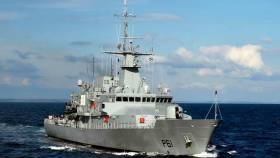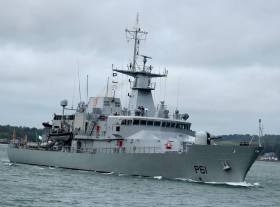Displaying items by tag: Open to Public
Leadship LÉ Samuel Beckett Open to Public in Galway Today Following Fishery Detention
#navy - The Irish Naval Service offshore patrol vessel, LÉ Samuel Beckett, will be offering guided tours to the public in the Port of Galway today, Saturday, 12th January.
The Samuel Beckett writes Galway Daily is currently docked in Galway after it detained a fishing boat for breach of regulations off the west coast yesterday.
The first fishing vessel detained by the naval service this year, it was handed over to Galway gardaí this morning.
While it’s around, the LÉ Samuel Beckett will be open for public tours while alongside this afternoon between 14:00-16:00.
To read more on the leadship of the P60 OPV90 class and sisters, click here
#Navy - A visitor to Waterford City today (Saturday, 24 March) is the leadship of the OPV90 class LÉ Samuel Beckett which is open to the public this afternoon between 2pm and 4pm..
The 'Samuel Beckett' class offshore patrol vessel is the first of a trio of sisters in the Irish Naval Service. The OPV is berthed at Frank Cassin Wharf (north side) of the River Suir.
In addition to the naval crew the Waterford Unit Naval Service Reserve (WUNSR) will be on board in providing information to potential NSR recruits. This is advance of NSR Recruitment Campaign beginning in April and running until June.
The OPV has carried out humanitarian missions in the Mediterranean in recent years under 'Operation Sophia' This involved search and rescue (SAR) operations which led to saving more than 1,000 migrants.
LÉ Samuel Beckett was built by Babcock Marine & Technology, Appledore, north Devon and was commissioned in 2014. The leadship forms part of modernisation programme to upgrade the fleet and so far has led to replacing a trio of ageing 'Emer' class OPV's.
A fourth sister, LÉ George Bernard Shaw earlier this month was floated-out of the building hall at Appledore downriver of Bideford. At that stage of the construction process, the hull and superstructure of the €67m newbuild were completed, though the mainmast and 76mm gun had yet to be added.






























































